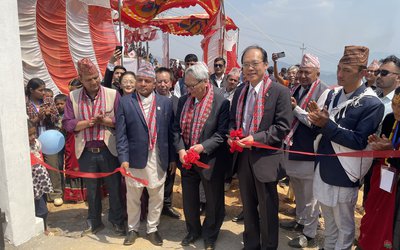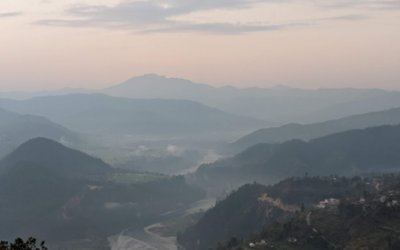With the launching of the construction of safe learning centers in Shreepur Chhatiwan Village Development Committee (VDC) in Makwanpur District, the new facility revives hopes in the rural and remote parts of Nepal to study in safe learning centers.
The European Union (EU) and the United Nations Children’s Fund (UNICEF) have started the construction of 650 transitional learning centers in collaboration with the Department of Education in nine earthquake affected districts to help restore education for one million children affected by the 2015 earthquakes.
In the absence of safe learning spaces, study of millions of Nepalese children in rural parts where earthquakes badly affected them. Due to destruction of school buildings, the schools were shut down for months.
According to an estimate, over 35,000 class rooms were completely destroyed by the earthquake. Given the present pace of reconstruction, it is likely to take decades to rebuild the schools again. The launching of construction of safe learning spaces has a significant role in the present context.
Amidst a ceremony held at Shreepur Chhatiwan Village Development Committee (VDC) in Makwanpur District, Andreas Roettger, Head of Cooperation at Delegation of the European Union to Nepal, broke the ground of the first of these transitional learning centers.
"These transitional learning centers will provide a better environment for teaching and learning for students and school teachers," said Roettger. "At the same time, it will impart the need for safer learning spaces, and raise awareness in the communities for better disaster preparation in the future."
The project worth 4 million Euro will assist in constructing the transitional learning centers in Gorkha, Kavrepalanchowk, Makwanpur, Nuwakot, Okhaldhunga, Ramechhap, Rasuwa, Sindhuli and Sindhupalchowk in collaboration with the Government and partners, as well as equipping them with educational materials.
These learning centers with corrugated galvanized iron sheet roofing, sturdier walls as well as gender-friendly WASH facilities will bridge the gap for learning spaces for the next couple of years until more permanent structures for schools can be built. Once established, these learning centers, with early childhood development centers, will also be provided with essential learning materials, and training on psychosocial counseling for 1,300 school teachers.
“Following the devastating earthquakes last year that destroyed or severely damaged over 35,000 classrooms, tremendous amount of effort was made to bring children back to school as soon as possible to minimize disruption of their education by establishing temporary learning centers," said Tomoo Hozumi, UNICEF Representative to Nepal. "In view of the continuing need for vigilance and preparedness for disasters in the country, we need to ensure safe learning spaces for children. The initiation of this new construction project by the Government of Nepal, EU and UNICEF will further enable us to support the national education system to build back better.”
Nepal has made a good progress in the areas of enrolment in primary schools in the last one decade. However, destruction of such a large numbers of classrooms will have drastic impacts. The step taken by EU and UNICEF is likely to help retain the progress made in the education sector.
- TANAHU HYDROPOWER PROEJCT: A Significant Achievement
- Apr 15, 2024
- AMBASSADOR HANAN GODAR: Sharing Pain With A Nepali Family
- Mar 30, 2024
- VISIT OF KfW AND EIB TO NEPAL : Mission Matters
- Mar 25, 2024
- NEPAL BRITAIN SOCIETY: Pratima Pande's Leadership
- Mar 24, 2024
- NEPAL ARMY DAY: Time To Recall Glory
- Mar 15, 2024
















